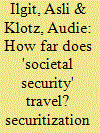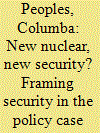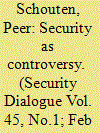|
|
|
Sort Order |
|
|
|
Items / Page
|
|
|
|
|
|
|
| Srl | Item |
| 1 |
ID:
131248


|
|
|
|
|
| Publication |
2014.
|
| Summary/Abstract |
Recent scholarship in critical security studies argues that matter matters because it is not an inert backdrop to social life but lively, affectively laden, active in the constitution of subjects, and capable of enabling and constraining security practices and processes. This article seeks to further the debate about materiality and security. Its main claim is that materials-oriented approaches to security typically focus on the place of materials and objects within technologies and assemblages of governance. Less often do they ask how materials and objects become entangled in political controversies, and how objects mediate issues of public concern. To bring publics and contentious politics more fully into the debate about the matter of security, the article engages with Latour's work on politics, publics and things - or dingpolitik. It then connects the theme of dingpolitik to a particular controversy: Human Rights Watch's investigation of Gaza civilians allegedly killed by Israeli drone-launched missiles in 2008-2009. Drawing three lessons from this case, the article explores how further conversation between dingpolitik and security studies can be mutually beneficial for both literatures.
|
|
|
|
|
|
|
|
|
|
|
|
|
|
|
|
| 2 |
ID:
131250


|
|
|
|
|
| Publication |
2014.
|
| Summary/Abstract |
Responding to political developments in Europe during the 1990s, the Copenhagen School drew on speech act theory to argue that state leaders represent certain issues, including immigration, as existential threats to society. Two decades of friendly amendments and vociferous critiques have raised questions about how well the Copenhagen School's core concept of 'societal security' travels outside Europe. To assess the scope of this 'securitization' framework more systematically, we examine South Africa, a democracy that recently liberalized its immigration policies despite ethno-nationalist and racist traditions. Specifically, we test four claims: (1) that official discourses will target certain foreigners as an existential threat to collective identity; (2) that bureaucracies will consistently institutionalize these discourses; (3) that identity-oriented groups will be crucial to any societal contestation over these discourses; and (4) that successful securitization produces regionalization. These securitization claims hold up well, even though the nature of threats to societal security shift over time. Keeping in mind that no theory is without weaknesses, we recommend wider integration of the societal security concept into comparative studies of immigration policy, especially in democracies outside Europe.
|
|
|
|
|
|
|
|
|
|
|
|
|
|
|
|
| 3 |
ID:
131252


|
|
|
|
|
| Publication |
2014.
|
| Summary/Abstract |
Despite considerable efforts, the concept of the 'mercenary' remains ill-defined within the scholarly literature on non-state combatants. In common usage, 'mercenary' is intended to function as a descriptive category of combatant, denoting certain unique or transhistorical properties. Instead, however, it is a highly subjective, imprecise and politicized term. This article critically analyses historical, legal and philosophical definitions of 'mercenary', and asks whether it is worth retaining the term as an analytical category at all. In short, the answer is no. The article's exposition of the 'mercenary moniker' uncovers the statist political ethic that anchors different interpretations of the mercenary concept. It shows that conceptions of the mercenary are deeply rooted in a Westphalian political ethic of war and conflict that upholds the instrumentality of the state to notions of political community, morality and identity. Accordingly, it argues that 'mercenary' should be jettisoned from the academic conceptual vocabulary of non-state combatants, and proposes 'freelance militant' as an alternative. Properly contextualized, this alternative could make possible a conceptual vocabulary that is able to clearly distinguish between such freelance militants and other non-state combatants.
|
|
|
|
|
|
|
|
|
|
|
|
|
|
|
|
| 4 |
ID:
131251


|
|
|
|
|
| Publication |
2014.
|
| Summary/Abstract |
Over the period of the past decade and across successive governments, the case for new nuclear power in the UK has, in policy terms, become embedded as a key facet of UK energy policy. Crucial in this respect, this article argues, has been the framing of the case for nuclear power stations and associated infrastructure in security terms: that is, the case for new nuclear power has come to be articulated and reiterated in direct relation to future energy provision and climate change as key impending 'security challenges' faced by the UK. This article assesses the political significance and effects of framing nuclear power in security terms. In particular, it focuses on how the specific and 'performative' framing of new nuclear power in relation to security has the political effect of narrowly defining and delimiting the ways in which security - and nuclear insecurities - can be articulated and understood.
|
|
|
|
|
|
|
|
|
|
|
|
|
|
|
|
| 5 |
ID:
131249


|
|
|
|
|
| Publication |
2014.
|
| Summary/Abstract |
Current Western security doctrines assert that state fragility, radicalization and humanitarian disasters in the global South feed into 'persistent conflict'. Such a scenario consequently requires a closely coordinated and integrated response from political and military actors. In this context, Western governments have introduced the concept of stabilization in their approaches to 'fragile' states. This article aims to understand the expanding activities of the US military in sub-Saharan Africa, which are conducted under the label of stability operations. It will be argued that the vast spectrum of activities under this label - from health projects to drone attacks - can be made comprehensible through the concept of policing, understood as processes of regulating communities with the aim of establishing 'good order'. Key pillars of the US military's stability operations operations doctrine - namely, a focus on the welfare of the population (on a par with the minimum use of force) as well as an extended preventative engagement - overlap with concerns of police power. Presented by security strategists as vulnerable to instability, sub-Saharan Africa has become an experimental ground for the US military, where ideas on stability operations are tested. Empirically, the article discusses two manifestations of stability operations that warrant an analysis through the concept of policing: US Africa Command's (AFRICOM) civil affairs projects and the US military's active involvement in ongoing conflicts.
|
|
|
|
|
|
|
|
|
|
|
|
|
|
|
|
| 6 |
ID:
127802


|
|
|
|
|
| Publication |
2014.
|
| Summary/Abstract |
Critical approaches to security have come to define themselves against mainstream security studies by not a priori assuming what security is, but rather taking it as an 'essentially contested concept'. Yet, as evidenced by the way in which recent 'turns' in the field have played out in the debate around airport security, ontological assumptions about security tend to restrict the scope of empirical analysis, with airport security being studied as, for instance, either discourse or practice. This article aims to propose an alternative methodological approach to security by studying security as controversy. Studying security as controversy means refraining from making a priori assumptions about the ontology of (in)security, instead considering it as itself at stake in - and hence the outcome of - security governance efforts. The article elaborates on this approach by drawing on core insights from actor-network theory, a conceptual and methodological toolkit that allows, as I show, a focus on how security actors perform security by enrolling, assembling and translating heterogeneous elements into stable assemblages that can be presented as definitive security solutions or threats. The article illustrates this approach through a look at the case of airport security at Amsterdam Airport in the aftermath of the 2009 Christmas terrorist attempt.
|
|
|
|
|
|
|
|
|
|
|
|
|
|
|
|
|
|
|
|
|